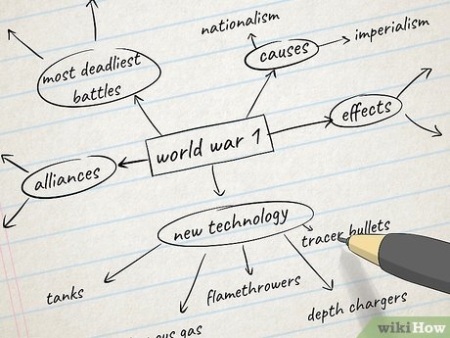how to be Good at Studying
Introduction
Studying can be a challenging task for many individuals, but with the right strategies and mindset, anyone can become successful in their academic endeavors. In this article, we will explore the meaning of being good at studying, how to achieve this goal, what is known about effective study habits, potential solutions to common study problems, and provide valuable information on how to improve your study skills. By following the tips and techniques outlined in this article, you can enhance your academic performance and reach your full potential as a student.
What do you mean by being good at studying?

Image Source: wikihow.com
Being good at studying means having the ability to effectively absorb and retain information, understand complex concepts, and apply knowledge in various contexts. It also involves developing critical thinking skills, problem-solving abilities, and a strong work ethic. Students who excel at studying are able to manage their time efficiently, stay focused and motivated, and demonstrate a genuine interest in learning. By mastering the art of studying, individuals can achieve academic success and reach their academic goals.
How to be Good at Studying
There are several strategies that can help you become good at studying. One of the most important aspects of effective studying is creating a conducive study environment. This includes finding a quiet, well-lit space where you can concentrate without distractions. It’s also essential to have all the necessary study materials, such as textbooks, notebooks, and writing utensils, readily available. Additionally, establishing a study routine and setting specific goals can help you stay organized and focused on your studies.
Another key factor in improving your study skills is developing good time management techniques. This involves creating a study schedule that allows you to allocate enough time for each subject or topic you need to cover. By breaking down your study sessions into manageable chunks and setting realistic deadlines, you can avoid procrastination and ensure that you cover all the material before exams.
Furthermore, it’s important to engage actively with the material you are studying. This can involve taking thorough notes, asking questions, participating in class discussions, and seeking clarification on any topics you find challenging. By actively engaging with the material, you can deepen your understanding and retention of the information, leading to better academic performance.
What is known about effective study habits?
Research has shown that certain study habits are more effective than others in promoting learning and retention. Some of the most effective study habits include spacing out study sessions over time, known as spaced repetition, which helps reinforce memory and improve long-term retention. Another effective study technique is self-testing, where students quiz themselves on the material to identify areas of weakness and reinforce learning.
Additionally, taking breaks during study sessions can help prevent burnout and improve focus and concentration. Short breaks every 25-30 minutes can help recharge your brain and enhance your productivity. Lastly, using mnemonic devices, visualization techniques, and other memory aids can help improve retention and recall of information.
Solutions to Common Study Problems
Many students face common study problems that can hinder their academic performance. Some of these problems include lack of motivation, poor time management, difficulty concentrating, and test anxiety. To address these issues, it’s important to first identify the root cause of the problem and then implement targeted solutions.
For example, if you struggle with motivation, try setting specific, achievable goals for yourself and rewarding yourself for meeting them. If you have difficulty concentrating, consider using focus-enhancing techniques such as the Pomodoro technique, which involves working in short, focused bursts followed by short breaks. If you experience test anxiety, practice relaxation techniques such as deep breathing or visualization to calm your nerves before exams.
Information on How to Improve Your Study Skills
Improving your study skills involves a combination of practice, perseverance, and patience. It’s essential to be proactive in seeking out resources and support to help you succeed in your academic endeavors. This can include seeking guidance from teachers, professors, or academic advisors, participating in study groups, or utilizing online resources and study aids.
Additionally, it’s important to stay organized and prioritize your study tasks based on their importance and deadline. By creating a study schedule, setting goals, and tracking your progress, you can stay on track and ensure that you cover all the material before exams. Finally, don’t be afraid to experiment with different study techniques and strategies to find what works best for you. Everyone learns differently, so it’s important to tailor your study approach to your individual learning style and preferences.
Conclusion
In conclusion, being good at studying requires dedication, effort, and a willingness to adopt effective study habits and techniques. By creating a conducive study environment, managing your time efficiently, actively engaging with the material, and seeking out support and resources, you can improve your study skills and achieve academic success. Remember that everyone has the potential to excel in their studies with the right mindset and strategies. By implementing the tips and techniques outlined in this article, you can become a more effective and successful student.
FAQs
1. How can I stay motivated while studying?
Staying motivated while studying can be challenging, but setting specific, achievable goals, rewarding yourself for meeting them, and maintaining a positive attitude can help keep you motivated.
2. What are some effective time management techniques for studying?
Effective time management techniques for studying include creating a study schedule, breaking down study sessions into manageable chunks, and setting realistic deadlines for completing tasks.
3. How can I improve my concentration while studying?
To improve your concentration while studying, try using focus-enhancing techniques such as the Pomodoro technique, taking short breaks every 25-30 minutes, and minimizing distractions in your study environment.
4. What are some relaxation techniques for reducing test anxiety?
Relaxation techniques such as deep breathing, visualization, and progressive muscle relaxation can help reduce test anxiety and calm your nerves before exams.
5. How can I enhance my memory and retention of information?
To enhance your memory and retention of information, try using mnemonic devices, visualization techniques, spaced repetition, and self-testing to reinforce learning and improve long-term retention.
6. What should I do if I’m struggling with a particular subject or topic?
If you’re struggling with a particular subject or topic, seek out additional resources and support, such as tutoring, study groups, or online resources, to help you better understand the material and improve your academic performance.
7. How can I tailor my study approach to my individual learning style?
To tailor your study approach to your individual learning style, experiment with different study techniques and strategies to find what works best for you. Everyone learns differently, so it’s important to find the methods that suit your preferences and strengths.
how to be good at studying







